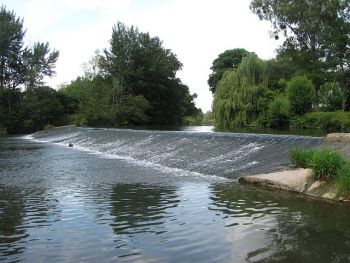Ogee-Crested Weirs: Difference between revisions
From ASDSO Dam Safety Toolbox
(Created page with "__NOTOC__ Category:Spillway Control Structures ---- “An additional type of weir is the ogee. The downstream section of an ogee crest is parabolic shaped to mimic the underneath side of the nappe jet passing over a sharp-crested weir. Ogee weirs are commonly found in large hydraulic structures where passing the design flow at minimum head is important. For more information on ogee crests, see U.S. Department of Interior Bureau of Reclamation, [[Design of Small Dams]...") |
No edit summary |
||
| (2 intermediate revisions by 2 users not shown) | |||
| Line 2: | Line 2: | ||
[[Category:Spillway Control Structures]] | [[Category:Spillway Control Structures]] | ||
---- | ---- | ||
{{Picture | |||
<!-- Add image file name (ex.image.jpg) --> | |||
|image= Dinham_Weir.jpg | |||
<!--Add link if applicable --> | |||
|link= | |||
<!-- Add picture caption --> | |||
|caption= Dinham Weir, UK. | |||
(Image Source: [https://commons.wikimedia.org/wiki/File:Dinham_Weir_-_geograph.org.uk_-_2698765.jpg Richard Webb]) | |||
}} | |||
“An additional type of weir is the ogee. The downstream section of an ogee crest is parabolic shaped to mimic the underneath side of the nappe jet passing over a sharp-crested weir. Ogee [[weirs]] are commonly found in large hydraulic structures where passing the design flow at minimum head is important. For more information on ogee crests, see U.S. Department of Interior [[Bureau of Reclamation]], [[Design of Small Dams]]."<ref name="NRCS650">[[National Engineering Handbook: Chapter 3 - Hydraulics|National Engineering Handbook, Part 650, Chapter 3 - Hydraulics, NRCS, 2021]]</ref> | “An additional type of weir is the ogee. The downstream section of an ogee crest is parabolic shaped to mimic the underneath side of the nappe jet passing over a sharp-crested weir. Ogee [[weirs]] are commonly found in large hydraulic structures where passing the design flow at minimum head is important. For more information on ogee crests, see U.S. Department of Interior [[Bureau of Reclamation]], [[Design of Small Dams]]."<ref name="NRCS650">[[National Engineering Handbook: Chapter 3 - Hydraulics|National Engineering Handbook, Part 650, Chapter 3 - Hydraulics, NRCS, 2021]]</ref> | ||
==Best Practices Resources== | ==Best Practices Resources== | ||
{{Document Icon}} [[Design of Small Dams| Design of Small Dams | {{Document Icon}} [[Design of Small Dams | Design of Small Dams, USBR]] | ||
<!-- For information on notation for in text citations visit https://www.mediawiki.org/wiki/Help:Cite Or simply enclose the citation as shown <ref> citation </ref> in the location of the in text mention. Citations will automatically populate below--> | <!-- For information on notation for in text citations visit https://www.mediawiki.org/wiki/Help:Cite Or simply enclose the citation as shown <ref> citation </ref> in the location of the in text mention. Citations will automatically populate below--> | ||
Latest revision as of 14:58, 25 July 2023

|
| Dinham Weir, UK.
(Image Source: Richard Webb) |
“An additional type of weir is the ogee. The downstream section of an ogee crest is parabolic shaped to mimic the underneath side of the nappe jet passing over a sharp-crested weir. Ogee weirs are commonly found in large hydraulic structures where passing the design flow at minimum head is important. For more information on ogee crests, see U.S. Department of Interior Bureau of Reclamation, Design of Small Dams."[1]
Best Practices Resources
Citations:
Revision ID: 7440
Revision Date: 07/25/2023
